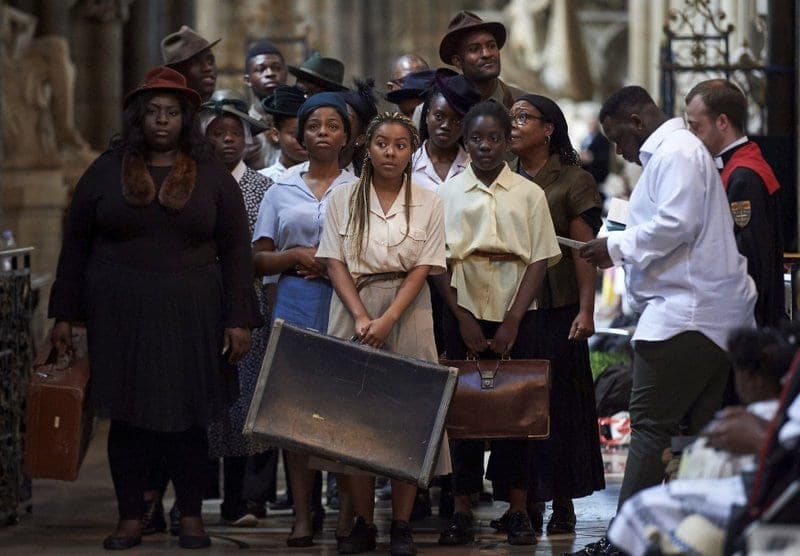LEICESTER, United Kingdom – Over 70 years ago, a ship arrived in the English port of Tilbury carrying more than 800 Caribbean immigrants to the country, the beginning of a new phase of immigration which changed the UK’s demographic landscape.
The ship was called the HMT Empire Windrush, and its 1948 arrival gave a name to the large number of immigrants that came to Britain from its then-colonies in the West Indies.
“June 22 is Windrush Day. It marks the arrival of the Windrush generation, giving us an opportunity to celebrate the contribution of the British Caribbean to the common good of UK society,” said Bishop Paul McAleenan, an auxiliary of the Diocese of Westminster.
McAleenan is the lead bishop for migration at the Catholic Bishops’ Conference of England and Wales.
“It is also a day to remember and regret what some of that generation were later to experience and are still experiencing,” the bishop added.
He was referring to the “Windrush Scandal” that led to the resignation of Amber Rudd as Home Secretary, who headed the UK government office that combines the roles of the U.S. Departments of Justice and Homeland Security.
In 1971, members of the Windrush generation were given “indefinite leave to remain,” which roughly corresponds to having a U.S. green card.
(This status was also based on the immigrants being citizens of the Commonwealth, the international organization headed by Queen Elizabeth II mostly made up of the countries of the former British Empire.)
However, many of these immigrants were never given any official paperwork, and those who came as children usually arrived on their parents’ passports. In 2010, the “landing cards” – which were filled in when the Windrush generation first arrived in the country – were destroyed, leaving no records of their entry into the country.
In 2010, the ruling Conservative party pledged to cut immigration to the UK to “the tens of thousands,” a target many experts saw as impractical.
Since that time, the government has made it more difficult for all sorts of immigrants to come to the country, including spouses of British citizens, students, and academic appointments.
They have also tightened up on the procedures for asylum seekers to prove their refugee status.
In 2016, the government began a new program to deport people who could not prove they were in the country legally, which threatened the estimated 60,000 Commonwealth immigrants from before 1971. Many suddenly couldn’t get public benefits, were dismissed from their jobs, and even told by the government they were going to be deported.
(The government later revealed that at least 63 people had been deported to the Caribbean.)
News that the members of the Windrush generation – who were in the country legally – were being treated in such a way caused a public uproar, even in the UK’s often anti-immigration tabloid press.
Last year, then-Prime Minister Theresa May, who previously served as head of the Home Office, personally apologized to Caribbean leaders for the way their citizens had been treated.
The decision had been based on the government’s “hostile environment” policy, which aims to make it difficult to live in the UK if you are an illegal immigrant.
“As a result of the Government’s hostile environment policies members of the Windrush generation were until very recently detained and even deported. The Government must now restore the human dignity of those whose rights were violated. They must ensure that necessary emergency support is provided and compensation made. Most of all they must take steps to ensure that such mistakes which undermine one’s God given value are never repeated,” McAleenan said.
At the height of the scandal in 2018, the government officially declared June 22 would be Windrush Day.
Despite the public relations maneuvers, members of the Windrush generation are still facing uncertainty about their status, and The London Economic has reported that at least 600 Caribbean immigrants have been refused entry into the Windrush scheme meant to expedite their paperwork.
“The Government’s immigration law and policy is inherently unjust towards Caribbean and commonwealth citizens who arrived during the Windrush period,” Janet Daby, a Member of Parliament told The London Economic.
The London-born Labour Party member is herself the daughter of members of the Windrush generation.
“This generation and their descendants are suffering and continue to suffer insurmountably when they are at the hands of the Home Office: Delays to outcomes; withdrawal of their passport; setting high bails; threatening deportation and retaining people for years as though they are criminals,” she told the newspaper. “They are destroying people’s and families’ lives.”
Follow Charles Collins on Twitter: @CharlesinRome
Crux is dedicated to smart, wired and independent reporting on the Vatican and worldwide Catholic Church. That kind of reporting doesn’t come cheap, and we need your support. You can help Crux by giving a small amount monthly, or with a onetime gift. Please remember, Crux is a for-profit organization, so contributions are not tax-deductible.















